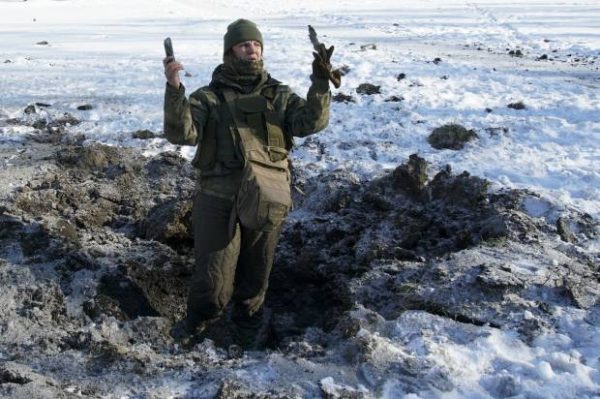
At least 33 people including civilians have been killed and several dozen injured in fighting this week in eastern Ukraine between government forces and Russia-backed separatist rebels – the worst violence in the region since 2015.
The death toll in the fighting that began in April 2014 has now exceeded 9,800, according to U.N. figures and a tally of recent fighting.
“Unacceptable! … Sides have to stop fighting!” the monitoring mission of the Organization for Security and Cooperation In Europe said on its Facebook page.
While the warring sides have regularly exchanged gunfire despite a February 2015 peace deal brokered by France and Germany, this week has seen a sharp spike in hostilities. Fighting has raged around the government-controlled industrial town of Avdiivka, just north of the main rebel stronghold of Donetsk, catching residential areas in the crossfire.
“We have seen on both sides an incredible amount of cease-fire violations,” said Alexander Hug, deputy head of the OSCE’s monitoring mission.
Each side blamed the other for the upsurge of violence, but the Ukrainian military says its troops have gained some ground.
Associated Press reporters saw heavy weapons on both sides of the front line, in clear violation of the 2015 peace deal that envisaged their pullback.
“We have seen the whole range of heavy weapons in the area here, starting from the smaller caliber mortars to larger caliber artillery to multiple launch rocket systems in the areas where they shouldn’t be,” Hug told reporters in Avdiivka. “We have seen them inside Avdiivka. We have seen them in Yasynovata. We have seen them in Donetsk city.”
Ukrainian President Petro Poroshenko has cast the outburst of fighting as an argument for continuing Western sanctions imposed on Moscow for its actions in Ukraine. New U.S. President Donald Trump’s repeated promises to improve relations with Russia have fueled concern in Ukraine that Washington would back off some of the sanctions.
The upsurge of hostilities around Avdiivka coincided with last weekend’s phone conversation between Trump and Russian President Vladimir Putin, their first since Trump took office. Putin on Thursday accused the Ukrainian leadership of ordering the attack in the east to pose as a victim to secure U.S. and EU support and prevent a thaw in Russia-West ties.
The new U.S. ambassador to the United Nations, Nikki Haley, on Thursday condemned Russia’s “aggressive actions” in eastern Ukraine and warned Moscow that U.S. sanctions imposed after its 2014 annexation of Crimea will remain until the peninsula is returned to Ukraine. But speaking for the first time at the Security Council, she tempered the criticism, saying “we do want to better our relations with Russia.”
Ukrainian U.N. Ambassador Volodymyr Yelchenko described Haley’s remarks as “extremely positive and extremely encouraging,” telling reporters that the U.S. is “very solidly behind” Ukraine.
U.S. Sen. John McCain, a strong critic of Russia, called on Trump to authorize sending lethal weapons to Ukrainian government forces.
The timing of the increased fighting “is an indication that Vladimir Putin is moving quickly to test you as commander in chief,” McCain said in a letter to Trump.
Jens Stoltenberg, the NATO secretary general, also voiced concern about the escalation in fighting.
“We call on Russia to use its considerable influence over the separatists to make sure that they respect the Minsk agreement and the cease-fire,” he said.
The Kremlin, in turn, has urged the West to persuade Ukraine to abide by the peace deal.
In the rebel stronghold of Donetsk, two civilians were killed late Thursday in a neighborhood that has been under intense fire in recent days, the rebels’ Donetsk News Agency said. Eight houses and two high schools were damaged in shelling Thursday night.
Russian Foreign Ministry spokeswoman Maria Zakharova lashed out at the Ukrainian government, saying the shelling of Donetsk “trampled on all moral norms.”
OSCE monitors on Friday visited a water filtration plant near the front line that has been damaged in recent shelling. The plant is crucial for the clean water supply on both sides of the conflict.
Hug warned that damage to the water plant in Yanysuvata, which has cut the water supply to Avdiivka, can lead to a “potential humanitarian and ecological disaster.”
A British photographer was wounded by shards of glass in Avdiivka in shelling Thursday night, according to the Facebook page of Ukraine’s anti-rebel military operation.
In Avdiivka, an industrial town whose pre-war population was about 35,000, residents were frightened and suffering through the loss of electricity and water amid a sharp winter cold snap.
“Of course, I’m really scared,” said Tamara Tokmanova, who said her father had died in World War II. “My dad died, for such a bad life for me!”
© 2017 The Associated Press

Leave a Reply
You must be logged in to post a comment.